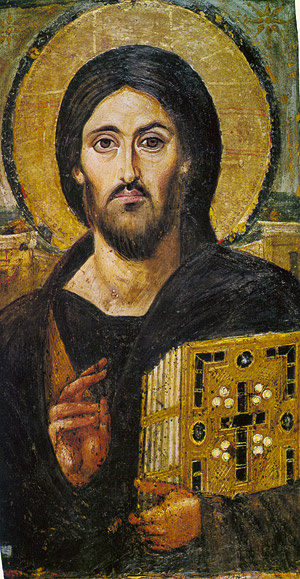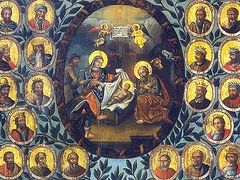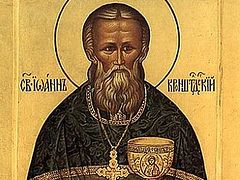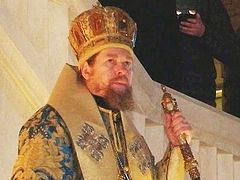 In the name of the Father, the Son, and the Holy Spirit.
In the name of the Father, the Son, and the Holy Spirit.
At Divine Liturgy on the Sunday before the Nativity of Christ we hear the book of the genealogy of Jesus Christ (Mt. 1:1–25). This is the commemoration of God’s chosen people, the commemoration of mankind.
Every nation, every person has his own genealogy that we do not keep in our memory. The memory of God’s chosen people is preserved eternally in the Holy Spirit. The whole genealogy of the Lord Jesus Christ is divided into three parts, with fourteen lines in each. The first part tells us about the history of the people up to David, the great king of Israel. David was the one who turned Israel into a glorious nation, so that the Jews became a powerful force in the world. The second part goes up to the Babylonian captivity, which was a terrible shame for the nation and its collapse; and the third goes up to Jesus Christ, Who saves His people from slavery and destruction.
These people whom the Lord chose are the righteous and the sinful, but in them was sanctity and love for God—for they so completely gave their lives, their flesh and blood to God, that throughout the ages, from generation to generation, was woven the flesh and blood of the most pure Body of the Savior, “Who became incarnate of the Holy Spirit and the Virgin Mary and became man.”
The book of the genealogy of Jesus Christ is the genealogy of all mankind in the person of its chosen, and of each one of us. On the Eve of the Nativity of Christ, each of us is called with renewed strength to become aware of our human dignity. God created man according to His own image and likeness, and man is created for communion with God. We are related to God Himself; we are His generation, and each of us is born in order to be king, in order to belong to the royal family of Christ.
Before embarking upon the bright feast of the Nativity of Christ, all of us must become deeply aware of our sinfulness, our fall away from God—for the Lord comes to save not the righteous but the sinners. Because God becomes man, in Him is unconquerable strength and love, and it is in no way impossible for Him to restore to the dignity that endows grace those who have fallen into captivity to the devil.
Today is a very appropriate day to ponder the fate of mankind and the Russian people, who also, in a different historical stage, became God’s chosen people, as St. John of Kronstadt says. For our people were entrusted with the preservation and multiplication of the precious talent of the only saving Orthodox faith.
What became of the God-chosen people, from whom the genealogy of Jesus Christ proceeded? Did the Lord save all of them, or, neither, because they are the seed of Abraham, are they all children (Rom. 9:7) as the apostle says? We hear the voice of our great prophet, Holy Righteous John of Kronstadt, whose memory the Russian Orthodox Church solemnly celebrates: “People of the original, antediluvian world,” says St. John, “were given 120 years as time for repentance, and they were warned that for their sins there would be a punishment from God—the flood. Time passed; people sank into depravity and did not think about repentance, they did not believe Righteous Noah, the preacher of repentance. And God’s word was fulfilled to the letter. The Jews did not believe the prophets who said that they would be taken captive by the king of Babylon; they continued their idol worship, and were taken captive. Jerusalem was razed, and all its riches went to Babylon. Jesus Christ’s contemporaries did not believe in Christ as the Messiah. They killed Him on the Cross, and Christ’s prophecy about Jerusalem was soon fulfilled: the Romans massacred the Jews without mercy.”
This was Holy Righteous John’s thinking—not “theology in general”, but the pain of a fervently loving heart in connection with what was happening in Russia. The great pastor’s every word was as if spoken today—or rather, his words sound even more powerful today. They are all the more powerful because the destruction of life has become even more deeply revealed over recent years. Open any page of his sermons and you will hear his lamentation over our Fatherland: “Russia is crumbling, suffering, tormented by its bloody, inner struggle, from godlessness, and an extreme moral decline. O evil times! People have turned into animals, even into evil spirits. Everyday life has begun to stench from all kinds of sins. Apostasy from the faith, ignorance of God, blasphemy—especially amongst the educated classes—have become as if rampant, endemic. Depravity has entered into everyday habits, and the press and literature are permeated with temptation. This is precisely why Russian society is now suffering—because it is has gone mad with all sorts of freedoms wrongly understood, commits all kinds of absurdities and ridiculousness, and chases after the fashionable new manner of government, of which it is absolutely incapable.”
“Marriage is being defiled,” he says in another sermon. “Family life is falling apart, there are no longer any firm politicians, everyone is politicizing, and everyone wants autonomy. The intelligentsia has no love for there Motherland, and they are ready to sell her to foreigners as Judas sold Christ to the evil scribes and Pharisees. In complete contradiction to the Gospel, a cult of fleshly passions has appeared—total, unrestrained debauchery with drunkenness, looting, theft of government and private banks, postal departments and packages—and Russia’s enemies are preparing a complete dissolution of the nation.”
And every time you read St. John of Kronstadt you don’t know what is more astounding—the terrible prophecies that have already happened or the fact that they are being revealed in our days. “In these last times,” he says, “the Russian kingdom has become a kingdom of unheard of and unexpected horrors; the sedition of revolutionists is devastating the Russian land, and these evil-doers are threatening to overturn the throne of the those in power and sit upon it themselves.”
Speaking of the destruction overtaking Russian for the lawlessness of the Russian people, Holy Righteous John always connects it with the nearness of the Second Coming of Christ. “Apparently, soon will come the day of the Second Coming of Christ, for the apostasy from the faith that was foretold in Scripture has already come to pass; although the “man of sin”, the son of perdition, the antichrist who opposes and exalts himself higher than everything called God or holy. For the mystery of iniquity doth already work: only he who now letteth will let, until he be taken out of the way (2 Thess 2:7)—the Sovereign, whose removal is being pushed by a certain public. And then will be revealed that lawless one, the antichrist, whom the Lord Jesus will kill with the spirit of His lips and destroy by the appearance of His coming; the one who acts from satan, and with all manner of false signs and wonders, and with every unrighteous deception of those who perish because they did not accept the love of truth for their salvation. Do you hear why? Because they did not accept the love of truth for their salvation. And for this, do you hear, God will send the spirit of delusion, so that they will believe a lie, and all will be judged who did not believe the truth but loved falsehood. And now truth has disappeared, and there is falsehood all around—both in the press and in life.”
How might we learn from the holy fathers and Holy Righteous John of Kronstadt to make a spiritual evaluation not only of those events about which we read even in Scripture, not those that happened yesterday, but which are happening today! We do not mean transient, motley vanity, but the very essence, divine Providence, which is always revealed in very specific events, at times determining the fate of the world. It is good to study one or another theological question, and Church history. But all of this, in the final analysis, has meaning only when it is applied to real life. This is so important, so bound up with all church experience, that I would like to dwell on this in more detail. Bishop Leonid (Kavelin) related the following important episode from the life of Metropolitan Philaret of Moscow, when our Church was preparing for his canonization. This story was written in 1871, four years after the Holy Hierarch’s death, and printed in the “Russian Archive” for 1901.
“One day,” he writes, “I noted to Vladyka that it would be good to fix in writing his thoughts about disagreements with schismatics. Metropolitan Philaret answered: “What’s the point?” “For the future”, I protested. Then the metropolitan began to speak with distress, his voice rising, that he feels that the future is concealed by a dark cloud, and when the thunder strikes, people who will be deeply shaken by this thunderbolt will lose their memory of everything that came before the storm. Two months before his death, he told the abbot of the St. Sergius Lavra that he has begun to see his past more clearly that he did before. The abbot asked him, “And what about the future?”
“The future, too,” answered the Metropolitan.
“What do you see in the future?”
“I see a terrible storm coming to us from the West.”
St. Theoophan the Recluse teaches us the same vision when he gives a spiritual assessment of events happening before his eyes. Even back in the 1860s–70s he said, “They’ve sunk up to their ears in the mud of the West and think that everything is alright. In one generation much of it, and in two, our Orthodoxy will completely dry up. Why did the French come to us in 1812? God sent them to destroy the evil that we had picked up from them. Such is God’s law of truth: Sin is cured by what has drawn a person to it.”
In 1907, Holy Righteous John of Kronstadt, during a time of complete quiet in Russia, saw the general insensitivity and lack of repentance and made a threatening prophecy: “Repent! A terrible time is coming nigh, a time so terrible that you can’t even imagine it.” This made a shocking impression. Those present were seized with terror, and weeping and lamentation filled the church. “My wife and I,” relates one Sursky, “were quite perplexed about what could possibly be ahead of us. Could it be war, earthquakes, floods? However, the prophet’s words were so powerful that we understood it would be something much more horrifying, and we expressed our supposition that the earth’s axis would turn upside down.”
As we know, Fr. John openly spoke against the revolution and in defense of the faith and the throne. He solemnly blessed the banners, the standard of the “Union of Russian People” and became an honorary member. In the book about Fr. John published by Chekhov Publishers are cited the words of a famous theologian in which he talks about these “faults” of Fr. John. He says, “However, all of these faults of Fr. John’s in no way obscure his pure and appealing spiritual countenance.” And then he condescendingly forgives these faults: “In appreciating Fr. John, we have to become higher than all of these external and incidental sides of his life.”
The earth’s axis has turned upside down, a sea of blood was spilled; but for those of abstract theology this was no more than external and incidental, politics! It is the same today, when both the Western and our own mud in which we’ve sunk even further than our ears, to use St. Theophan’s expression, and there is a terrible bloodbath. But this is merely external and incidental for people who have in fact merged into politics. For them, “nothing in particular has happened.”
Before the triumph of evil takes place there is a triumph of lies. This is what today’s feast teaches us: God’s word should never be something abstract for us. What we heard in the Gospel—about grandeur and shame, and a new glory for every person and every nation—let us apply in full measure to ourselves, cherishing as the most precious treasure the mystery of our relatedness to Christ and to all those who over the span of millennia have entered into this unfathomable, dread, and immortal relationship. In this is the is the mystery of our salvation and participation in the salvation of our people. As another great prophet of Russia’s way of the cross, St. Seraphim of Sarov, said: The grace of true Communion is so great that it is marked upon the entire family line of those who partake of it. St. John partook of such grace, and today along with the holy fathers he calls us to true Communion, when we unite all our lives, bodies, and blood with Christ. And this means that together with Him we will be there, where His sufferings on the Cross are today.
The word of God possesses such penetrating power that it is present in all historical events. The Apocalypse is not only a book at the end of the Bible. We must learn to read this book in what is being revealed by today’s life. As St. Anthony the Great said, there are two Bibles—one is Holy Scripture, and the other is the book of nature. And both are written by the same author. We live in a time when the book of nature, it could be said, is disappearing. What remains, besides Holy Scripture, is the terrible book of events. On the Eve of the Nativity of Christ, the feast of the Incarnation of God the Word, let us not forget about the feast—when the word of God that we read in the Gospel, as the holy fathers witness, becomes incarnate in human life. Amen.



